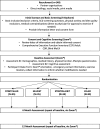Rationale and protocol of the LEAD 2.0 study: a randomized controlled trial assessing the feasibility of a virtually delivered 6-month exercise and nutrition intervention in older adults with subjective cognitive decline (SCD)
- PMID: 40349092
- PMCID: PMC12065297
- DOI: 10.1186/s40814-025-01626-4
Rationale and protocol of the LEAD 2.0 study: a randomized controlled trial assessing the feasibility of a virtually delivered 6-month exercise and nutrition intervention in older adults with subjective cognitive decline (SCD)
Abstract
Background: With growing prevalence of dementia worldwide, dementia risk reduction is a key interest of the World Health Organization's Global Dementia Action Plan. Subjective cognitive decline (SCD) is a prominent predictor of future dementia diagnosis. Therefore, people with SCD are an important group for dementia prevention intervention. Exercise and healthy diet are associated with a 30-60% decrease in dementia risk in longitudinal studies. Technological advances yield the potential of trials that deliver lifestyle interventions virtually, reaching people in a wide geographical spread. However, the feasibility of large-scale virtual trials still needs to be established.
Objective: This trial aims to examine the feasibility of a factorial randomized controlled trial exploring a 6-month virtual, exercise and healthy diet intervention. Secondary objectives will examine whether feasibility outcomes vary by gender or technology access.
Methods: We will recruit 140 older adults (65 + years) with SCD, who will receive a combination of Aerobic and Resistance Exercise (EX) or Stretching and Toning (STRETCH) and either Diet Counseling (DIET) or Brain Health Education (ED). Participants will be randomized to four weekly hours of one of four intervention arms: (1) EX and DIET; (2) EX and ED; (3) STRETCH and DIET; or (4) STRETCH and ED. EX will include moderate intensity aerobic and resistance training. DIET will instruct participants in brain healthy food choices. Assessments will be performed virtually at baseline, 6 months (post-intervention), and 12 months. Feasibility will be measured by recruitment rate, adherence, and retention.
Discussion: Established feasibility will set the stage for a definitive trial. Feasibility results will also inform future virtual programs/services. In the long-term, if the interventions are feasible and beneficial, this intervention model could scale up and spread quickly to reach at-risk individuals for the purpose of dementia risk reduction.
Trial registration: The Lifestyle, Exercise, and Diet (LEAD 2.0) study is registered with the US National Institutes of Health clinical trials registry (ClinicalTrials.gov identifier NCT06078748). This report complies with the Standard Protocol Items: Recommendations for Interventional Trials (SPIRIT) statement.
Keywords: Cognition; Diet; Exercise; Feasibility; RCT; Virtual.
© 2025. The Author(s).
Conflict of interest statement
Declarations. Ethics approval and consent to participate: Ethics approval has been granted by the University of Waterloo Research Ethics Board (#44616) and by the Baycrest Research Ethics Board (#23–24). All participants will sign an informed consent form during the screening process. Consent for publication: Not applicable, this manuscript contains no participant data. Competing interests: The authors declare that they have no competing interests.
Similar articles
-
Body, Brain, Life for Cognitive Decline (BBL-CD): protocol for a multidomain dementia risk reduction randomized controlled trial for subjective cognitive decline and mild cognitive impairment.Clin Interv Aging. 2018 Nov 21;13:2397-2406. doi: 10.2147/CIA.S182046. eCollection 2018. Clin Interv Aging. 2018. PMID: 30538436 Free PMC article.
-
A Mindfulness-Based Lifestyle Intervention for Dementia Risk Reduction: Protocol for the My Healthy Brain Feasibility Randomized Controlled Trial.JMIR Res Protoc. 2024 Nov 21;13:e64149. doi: 10.2196/64149. JMIR Res Protoc. 2024. PMID: 39571150 Free PMC article.
-
The Brain in Motion II Study: study protocol for a randomized controlled trial of an aerobic exercise intervention for older adults at increased risk of dementia.Trials. 2021 Jun 14;22(1):394. doi: 10.1186/s13063-021-05336-z. Trials. 2021. PMID: 34127029 Free PMC article.
-
Computerised cognitive training for 12 or more weeks for maintaining cognitive function in cognitively healthy people in late life.Cochrane Database Syst Rev. 2020 Feb 27;2(2):CD012277. doi: 10.1002/14651858.CD012277.pub3. Cochrane Database Syst Rev. 2020. PMID: 32104914 Free PMC article.
-
Lifestyle changes for treating psoriasis.Cochrane Database Syst Rev. 2019 Jul 16;7(7):CD011972. doi: 10.1002/14651858.CD011972.pub2. Cochrane Database Syst Rev. 2019. PMID: 31309536 Free PMC article.
References
-
- World Health Organization. Dementia. 2023. Available from: https://www.who.int/news-room/fact-sheets/detail/dementia. Cited 2023 Nov 1.
-
- World Health Organization. Global action plan on the public health response to dementia 2017–2025. Available from: https://www.who.int/publications/i/item/global-action-plan-on-the-public.... Cited 2023 Nov 1.
-
- Livingston G, Sommerlad A, Orgeta V, Costafreda SG, Huntley J, Ames D, Ballard C, Banerjee S, Burns A, Cohen-Mansfield J, Cooper C, Fox N, Gitlin LN, Howard R, Kales HC, Larson EB, Ritchie K, Rockwood K, Sampson EL, Samus Q, Schneider LS, Selbæk G, Teri L, Mukadam N. Dementia prevention, intervention, and care. Lancet. 2017;390(10113):2673–734. 10.1016/S0140-6736(17)31363-6. PMID: 28735855. - PubMed
-
- Centers for Disease Control and Prevention. Subjective cognitive decline — a public health issue. 2019. Available from: https://www.cdc.gov/aging/data/subjective-cognitive-decline-brief.html. Cited 2023 Nov 14.
-
- Statistics Canada. Seniors and aging statistics. 2020. Available from: https://www.statcan.gc.ca/eng/subjects-start/seniors_and_aging. Cited 2023 Nov 1.
Associated data
Grants and funding
LinkOut - more resources
Full Text Sources
Medical


